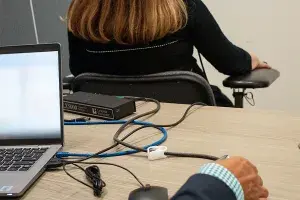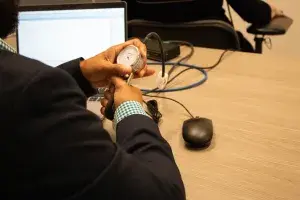 Special Agent Taj Mathew conducted a polygraph demonstration. (Photo courtesy of SCPA)
Special Agent Taj Mathew conducted a polygraph demonstration. (Photo courtesy of SCPA)
After being accused of theft by a passenger while screening on checkpoint, a TSA officer (TSO) voluntarily submitted to a polygraph test to help clear his name.
That’s when the very stressed Officer first met TSA Special Agent and Polygraph Examiner Taj Mathew.
“Without any physical evidence available to prove or disprove the allegation, I conducted a polygraph on the TSO,” recalled Mathew.
Mathew and his polygraph colleagues aren’t a well-known part of the agency, but as the accused TSO was to learn, they are a specialized, highly credentialed and well-trained group within TSA Investigations who are just as passionate about keeping people safe and secure as are our dedicated and very visible uniformed Officers.
“The mission of the TSA National Polygraph Program, which resides within TSA Investigations, is to conduct counterintelligence and specific issue examinations in support of criminal and administrative investigations, as well as to support TSA in pre-employment polygraph exams for TSA Law Enforcement Officer positions, including Federal Air Marshals,” explained Special Agent in Charge (SAIC) Robert Yeager.
Putting aside sensational theatrical images about what’s mistakenly called a lie detector test, a polygraph measures and records several physiological indicators such as blood pressure, heart rate and blood volume, respiration and sweat activity while the person is asked and answers a series of previously reviewed questions. Modern polygraph technology and procedures produce carefully administered tests by qualified examiners and are painstakingly reviewed for quality control.
“It is not an easy task to become a member of this team due to the high standards set by the National Center for Credibility Assessment, the entity that governs all federal polygraph programs,” said Yeager, justifiably proud of his staff. “The list of qualifications includes, a 4-year degree, a minimum of 2 years of investigative experience, the completion of the Physiological Detection of Deception course (12 weeks), successful completion of an approved intern program and once certified, federal examiners need to complete 40 hours (or 80 hours over a two-year period) of continuing education in polygraph each year to maintain their certification.”
In the instance of the accused TSO with no evidence to support either side of the dispute, a TSA case agent submitted a polygraph request, explaining how the results would be helpful in advancing the investigation. Yeager reviewed, approved and then assigned the case to Mathew, himself the subject of seven polygraphs in his law enforcement and intelligence career.
“I don’t take any polygraph lightly, whether it’s for an applicant to TSA, a counterintelligence exam, or a criminal test,” said Mathew of his moral and ethical approach to each case. “A TSA employee who is under investigation may have their job at risk.”
Mathew’s due diligence prior to the exam involved connecting with the case agent to become well-informed of the incident details before traveling to the field location to administer the test.
“As the examiner, I went over the case with a fine tooth comb and then coordinated with the case agent for additional fine tuning,” said Mathew. “Once the case agent confirmed the examinee was willing to undergo a polygraph, I set up a date and time at the field location.”
Making sure the examinee has a fair test is the first priority in conducting an exam. The process takes a few hours and can’t be rushed.
Mathew prepared a quiet and sterile location to test the accused TSO, calibrating the highly sophisticated and expensive equipment. Before the case Mathew talked with the Officer, introducing himself and briefly explained the polygraph process, making sure the TSO understood it was voluntary and that no disciplinary action would be taken if he declined the exam.
“During the investigation, the TSO was very stressed out and hurt that someone would have accused him of stealing,” remembered Mathew.
Given the seriousness of the case and what was at stake, it’s obvious an examinee would be nervous.
“When it comes to nervous tension, if you’re nervous, you’re focused, you’re engaged, you’re paying attention,” said Mathew during a recent polygraph demonstration. A practice test is typically done first to get the subject used to the procedure.
“The main challenge I encounter is helping the examinee understand that polygraph examiners do not prejudge the situation, no matter how the case facts look,” said Mathew. “I gather the polygraph data and make a determination on the data.
“I had the examinee address what things really concern him and what stories he had heard (about polygraphs). We discussed why he felt that way, and I set the record straight.”
Once the test was complete, Mathew made a field determination at the end of the polygraph, a conclusion which was sent through multiple levels of quality control, including a thorough review of the data he collected with a final review by Yeager. The approved report was then given to the case agent.
“He passed his polygraph on whether or not he stole those items and the case was closed,” said Mathew. “After he cleared his polygraph, he told me a huge weight was lifted off his shoulders.”
Other Success stories
The TSA polygraph program has also rooted out and prevented people who have committed serious crimes which went undetected prior to the polygraph from joining TSA. These people posed a potential risk to TSA and lacked the integrity to be a federal employee.
This year, the Investigations Technical Services Branch has obtained confessions on child exploitation cases, conduced or reviewed over 500 pre-employment exams for the Federal Air Marshal Service hiring initiative and cleared many employees accused of criminal and administrative misconduct.
“Over the past year the team has been busy in reviving a program that supports the Border Corruption Task Force and the TSA National Polygraph Program has recently partnered with Homeland Security Investigations and the Internet Crimes Against Children Task Force to support investigations to counter human trafficking and child sexual exploitation,” said SAIC Yeager. “I couldn’t be prouder of this team and the work they are doing to support the TSA and DHS mission sets.”
By Karen Robicheaux, TSA Strategic Communications and Public Affairs



